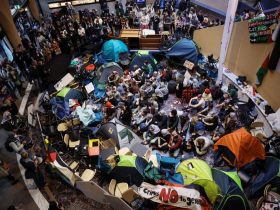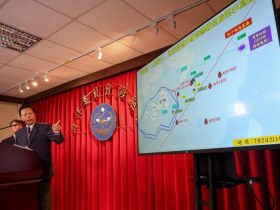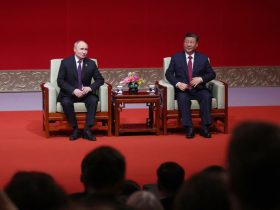Israeli forces launched what a military source said is its largest military operation in the occupied West Bank city of Jenin in more than 20 years, killing at least 10 people and injuring about 100 others, according to Palestinian officials.
The Israel Defense Forces (IDF) said in a statement it launched the ongoing “extensive counterterrorism effort in the area of the city of Jenin and the Jenin Camp,” striking “terrorist infrastructure.”
The IDF carried out around 10 airstrikes using drones, and hundreds of soldiers targeted what it said was a militant “command and control” center as well as weapons and explosive manufacturing sites.
Hundreds of Palestinian families fled the area amid the destruction; Jenin deputy mayor Mohammed Jarrar said homes and infrastructure had been destroyed, cutting off electricity and water in the refugee camp.
Duha Turkman, a 16-year-old Jenin resident, said they were given two hours to evacuate.
In pictures: Israel’s military operation in Jenin
Five of those killed in the attack were teenagers, the Palestinian Ministry of Health said, later adding that the body of the tenth Palestinian person to be killed was discovered on Tuesday.
An eleventh Palestinian was shot and killed by Israeli forces near Ramallah in the West Bank in a separate incident, according to the health authorities.
IDF chief spokesperson Rear Admiral Daniel Hagari earlier told reporters “eight terrorists” were killed in Jenin and there are “no non-combatants that have died as far as we know.”
Hagari acknowledged that civilians were among the injured, but insisted the operation only meant to target “terrorists.” “It’s not an invasion on Jenin, it’s not against the Palestinian Authority. It’s not against innocent, innocent Palestinians. It’s against terrorists in this camp,” he said.
The raid sparked immediate condemnation. Palestinian Authority President Mahmoud Abbas called the large-scale Israeli military operation “a new war crime.”
“Security and stability will not be achieved in the region unless our Palestinian people feel it. What the Israeli occupation government is doing in the city of Jenin and its camp is a new war crime against our defenseless people,” he said, according to presidential spokesman Nabil Abu Rudeineh.
Egypt also condemned the Israeli incursion, calling it an act of “aggression.”
Israeli Prime Minister Benjamin Netanyahu said the military acted “against terrorist strongholds in Jenin.”
“In recent months, Jenin has become a safe haven for terrorists from that safe haven. Terrorists perpetrated savage attacks, murdering Israeli civilians, men, women, and children, as many children as they could find,” Netanyahu said at a US embassy event in Jerusalem on Monday evening.
“As I speak, our troops are battling the terrorists with unyielding resolve and fortitude while doing everything, everything to avoid civilian casualties.”
‘Horrifying day’
Jenin resident Lina Amouri, 35, said her family hid from the gunfire until they heard mosques announcing the evacuation.
“We were all hiding in one apartment that didn’t have windows so we don’t risk anyone getting hit by a bullet. Three women and six children aged 1 to 9, since 5 a.m., with no electricity or internet connection. It was a horrifying day,” she said.
“The children were crying all day and we didn’t know how to calm them down, the only thing we could do is to pray together while we hear explosions and bulldozers outside.”
Amouri also compared the scene to a natural disaster.
“When we first went out to see what’s happening it was a totally different place, all streets were plowed, water and sewage pipes were broken, electricity poles were down, cars were piled one on the other. It felt like a storm with earthquake have just passed by.”
“They invaded our house in the early morning, they locked us all in one room, five women and two children in one room, and in another room, they locked five men – my father, brothers and uncles,” she said.
“They took the house as snipers’ position to attack the camp, meanwhile we couldn’t use a toilet, get to the kitchen or do anything but sit in the room and listen to the explosions outside.”
Humanitarian access
The UN Special Coordinator for the Middle East Peace Process Tor Wennesland has said he was in direct contact with all relevant parties to urgently de-escalate the situation in Jenin and ensure humanitarian access.
“The operation comes after months of growing tension that once again reminds us of the extremely volatile & unpredictable situation across the occupied West Bank. All must ensure the civilian population is protected,” Wennesland said.
The Palestinian Red Crescent said crews were prevented from operating within the camp, according to the director of the Palestinian Red Crescent society in Jenin, Mahmoud al-Saadi.
“The ambulance crews managed to evacuate a number of the injured they were able to access. The paramedic crews were brought from other governorates to provide help,” al-Saadi said.
The international medical aid organization Doctors Without Borders (MSF) also accused Israeli forces of impeding access to medical care in Jenin.
“MSF staff have been treating patients since 2 a.m. local time at Khalil Suleiman hospital, where several gas canisters landed in the courtyard during the attack. So far, staff have received 55 wounded patients, including people with gunshot wounds to their heads and some who were hit with tear gas canisters,” MSF said.
The military operation has not only caused casualties but also disrupted health structures, impeding the medical response, according to the MSF statement.
“We’ve been working for 15 hours and patients keep coming in,” said Jovana Arsenijevic, MSF operations coordinator in Jenin. “This is an unprecedentedly long military operation, and yet there are still victims that cannot be reached.”
“Raids on Jenin camp have started to follow a familiar pattern. For example, ambulances have been rammed by armored cars, and patients and health care staff have routinely been denied entry and exit in the camp,” Arsenijevic also said.
The IDF refuted claims that ambulance crews faced obstacles, with Hagari saying cars were denied movement within the camp, but that ambulances “have a free pass.”
The director of the United Nations Relief and Works Agency (UNRWA) in the West Bank, Adam Bouloukos, said the Israeli operation and the response of “armed actors” in Jenin has “tragic consequences” for Palestinian refugees.
“Humanitarian access is most urgent now,” Bouloukos said on Twitter.
The spokesperson added broadly, “We support Israel’s security and right to defend its people against Hamas, Palestinian Islamic Jihad, and other terrorist groups.”
IDF trying to break ‘safe haven’
IDF spokesman Lt. Col. Richard Hecht told reporters Monday one of the goals of the operation was to break the “safe haven” mentality within the Jenin camp for militants, according to Hecht, who described it as a “hornet’s nest.”
“We’re not trying to hold the ground. We’re acting against specific targets,” Hecht said.
The first round of airstrikes were launched at 1:14 a.m. local time and were followed by IDF ground forces, Hecht said.
Some 50 shooting attacks against Israelis have emanated from Jenin, he said.
Hecht also said the Palestinian Authority and Jordan had been informed about the incursion in advance, but didn’t elaborate further.
Though the IDF spokesman declined to comment on the number of forces involved, he said it is around a brigade, which is approximately equivalent to at least 500 soldiers.
A spokesman said later an Israeli soldier was “slightly injured” by shrapnel from a grenade used during the incursion, and that they had been taken to a hospital for medical treatment.
The IDF said it struck a joint operational command center for the Jenin Camp and operatives of the Jenin Brigade, a Palestinian militant group associated with Islamic Jihad.
“The operational command center also served as an advanced observation and reconnaissance center, a place where armed terrorists would gather before and after terrorist activities,” the IDF said, adding that the camp was a “site for weapons and explosives” and “hub for coordination and communication among the terrorists.”
“Additionally, the command center provided shelter for wanted individuals involved in carrying out terror attacks in recent months in the area,” it said.
The IDF later said its forces targeted a weapons production and explosive device storage facility and confiscated an “improvised rocket launcher” and additional weapons during the operations, which were carried out in coordination with the Israel Securities Authority (ISA).
Later on Monday, an IDF aircraft struck near a mosque “to remove a threat” while soldiers engaged in a firefight with militants according to the IDF, without elaborating on the character of the “threat.” The IDF later said tunnels and weapons were found under the mosque.
Military bulldozers tore up streets in the camp, which the IDF said was to disarm potential explosive devices buried under the roads.
Calls for action
In response to Monday’s attacks, Hamas called on militants in the West Bank and Jerusalem to strike Israel “by all available means,” a statement by its military wing said.
Palestinian Islamic Jihad said it will “perform its duty” in stopping the “massacre” in Jenin.
Monday afternoon, Israeli police reported a Palestinian teenager stabbed an Israeli man in Bnei Brak, outside of Tel Aviv. Israeli police said the teen claimed “he stabbed the person in response to the events in Jenin.” The Israeli man was injured and moved to hospital.
The Jenin Brigade claimed it had severely damaged at least one Israeli military vehicle with improvised explosive devices and its militants continue to clash with Israeli forces “to prevent its advance inside the camp.”
Palestinian Islamic Jihad said it will face its enemy “with all possible retaliation options,” in response to the Israeli operations in Jenin.
“The aggression on Jenin will not achieve its targets, Jenin will not surrender. We will face the enemy with all possible retaliation options in response to the enemy aggression on Jenin,” the militant group posted to its official Telegram channel.
As night fell, more than 500 Palestinian families began leaving the refugee camp, the Palestinian Red Crescent said, out of fear of what the ensuing hours would bring.
Hagari told reporters the operation will end within the “next day or two.”
“It won’t be the last time we act,” he warned. “We act when we have intelligence. We act against terror before it happens, or we act after terror activities in order to reach the terrorists.”






